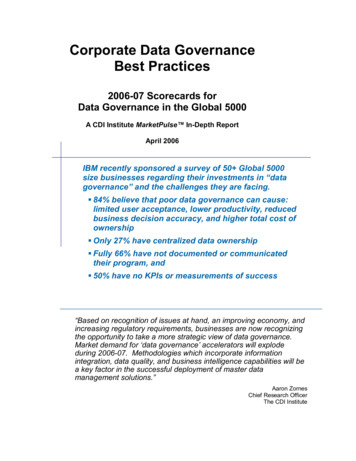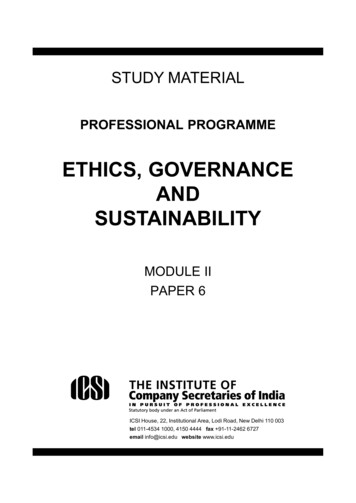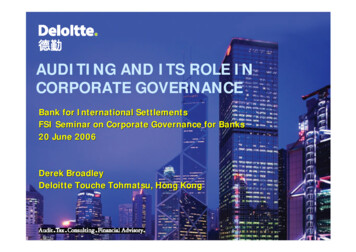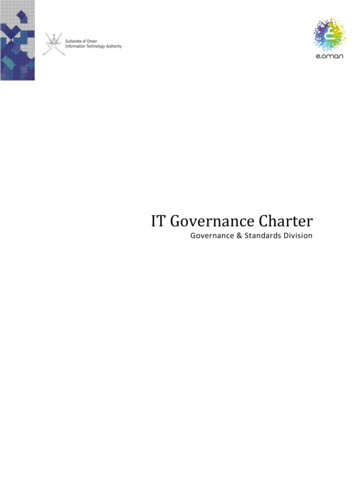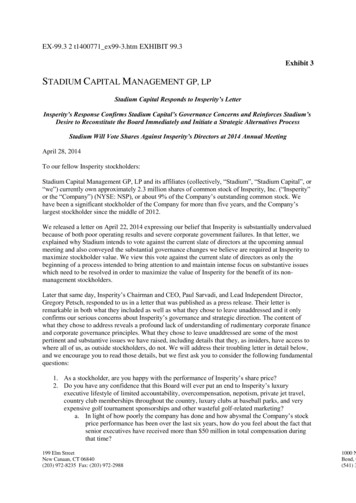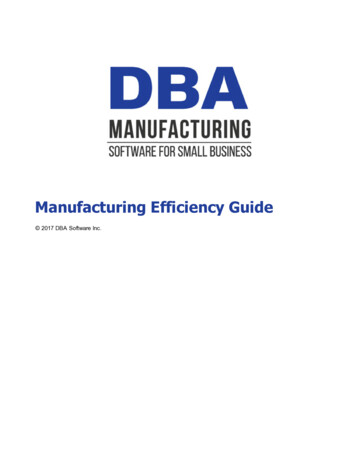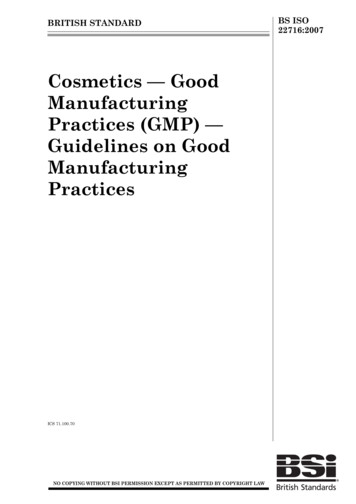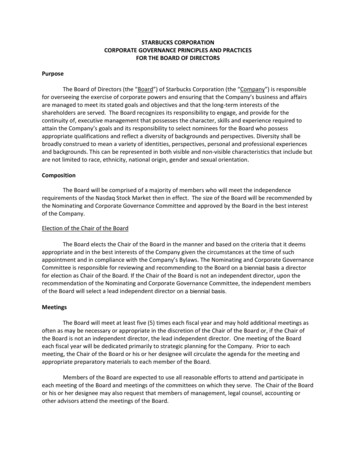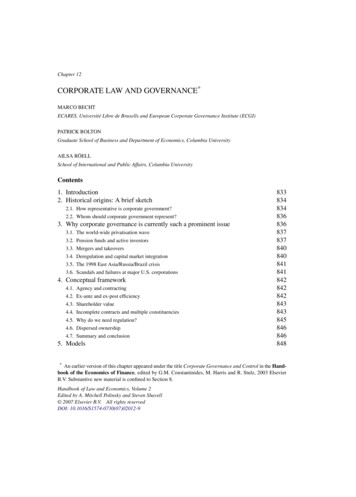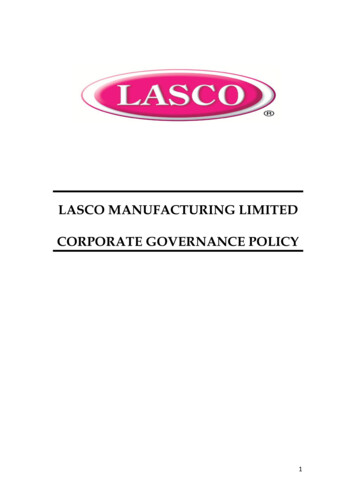
Transcription
LASCO MANUFACTURING LIMITEDCORPORATE GOVERNANCE POLICY1
TABLE OF CONTENTS1. INTRODUCTION .32. THE BOARD OF DIRECTORS . 43. COMPOSITION AND SELECTION OF DIRECTORS . 74. BOARD MEETINGS . 85. PERFORMANCE EVALUATION . 96. DISCLOSURES AND DEALINGS IN SHARES . 97. BOARD COMMITTEES . 107.2 Audit & Compliance Committee . 117.4 Nomination Committee . 117.5 Compensation Committee . 138. RELATIONSHIP WITH SHAREHOLDERS . 149. AMENDMENTS TO THIS CORPORATE GOVERNANCEPOLICY .142
1. INTRODUCTIONThe Board of Directors (“the Board” or “Directors”) of LASCO ManufacturingLimited (LML) recognizes that high quality corporate governance helps to underpinlong-term company performance resulting in high levels of investor confidence.In this context, the Board has reviewed and adopted the Principles based on theCode on Corporate Governance promulgated by the Private Sector Organization ofJamaica. In accordance with the said Principles and on an ongoing basis, the Boardwill assess and implement best practices as it deems appropriate.1This Corporate Governance Policy is designed as a guide to ensure the Board’scompliance with good corporate governance and Best Practices to effectively achievethe Company’s objectives and to ensure that its obligations to its shareholders aremet. This is an active and engaged responsibility that requires the Board to regularlyreview and monitor the effectiveness of management’s performance in carrying outthe policies of the Board and management’s decisions and strategies it documentsthe Company’s standards governing Board composition and effectiveness, the roleof Board Committees, risk management, remuneration, evaluation and relationswith its shareholders.This policy document has as its primary function the attainment of the objectives ofthe shareholders of the company and in its application due consideration and regardmust be given to the objectives set by the shareholders to the intent that thoseobjectives are paramount; they are the corporate purposes.1See the Combined Code on Corporate Governance as consolidated and refined by Hampel and see the ListingRules in the United Kingdom.3
2. THE BOARD OF DIRECTORS2.1FUNCTIONS AND RESPONSIBILITIES2.1.1 The Board’s primary responsibility is to provide effective governance insupervising the management of the Company’s affairs to ensure that all itsstakeholders are protected. In doing so it must strive to balance the interests ofthe Company’s diverse constituencies, including its shareholders, customers,suppliers, employees, creditors2 and the communities in which it operates. Indischarging their responsibilities, Directors are expected to act honestly and ingood faith in the exercise of due care and to act in the best interest of theCompany, and in doing so, may rely on the advice and reports of the Company’sSenior Management, and other independent professionals.2.1.2 The Board makes its decisions directly or through its established SubCommittees, and reviews and approves key policies and supervises themanagement of the Company particularly in relation to:i.Business strategy, including annual operating plans and budgets;ii.Business development initiatives including major investments anddisposals; 3iii.Corporate governance;2At common law the Directors of an insolvent company must have regard to the interest of its creditors. SeeWEST MERCIA SAFETYWEAR LTD. v DODD (1988) B.C.L.C. 250 AND in Australia it has been held that even if thecompany is not insolvent but the director knows that there is a real risk of insolvency the director has a duty to thecompany’s creditors. See COLIN GWYER & ASSOCIATES LTD. v LONDON WHARF LIMITATIONS LTD. (2003) 2B.C.L.C. AT 153 per Judge Leslie Kosmin as follows: “Where a company is insolvent or of doubtful insolvency or onthe verge of solvency and it is the creditors money which is at risk, the directors, when carrying out their duty tothe company, must consider the interest of the creditors as paramount and take those into account whenexercising their discretion.” In considering the rights of creditors it must be borne in mind that there is no rule thatcontinuing to trade whilst insolvent is fraudulent. In re WHITE OSMOND (PARKSTONE) LTD. Ch. D 1960 Buckley Jsaid: “There is nothing to say that the directors who genuinely believe that the clouds will roll away and thesunshine of prosperity will shine upon them again and disperse the fog of their depression are not entitled toincur the credit to help them get over the bad time.” Further, the fact that the company is trading whilst insolventdoes not itself mean that the trading is wrongful so as to create a liability under the statute or otherwise. There iswrongful trading only if there is no reasonable prospect of not going into insolvent liquidation. If there is areasonable prospect of not going into insolvent liquidation, liability for wrongful trading does not arise. See in thisregard SECRETARY OF STATE FOR TRADE AND INDUSTRY v TAYLOR (1997) 1 WLR 407.3This requirement affects what is described as the ‘fiduciary duty of directors’ as it cannot be equated to that of anormal trustee who cannot take risks with the trust assets. An act done in the unreasonable belief that it was inthe interest of the company is not in breach of the fiduciary duty provided the belief was held honestly. SeeEXTRASURE TRAVEL INSURANCE LTD. v SCATTERGOOD (2003) 1 B.C.L.C. 598 at 90 and 97.4
iv.Compliance with applicable laws, regulations and codes of ethicalbusiness conduct; stainableenvironmental practices; 6vi.Corporate financing and treasury related activities;vii.Compensation, including directors and executive compensation andoverall remuneration policies and practices (including employeebenefit plans);viii.Risk management and the adequacy of financial controls; 7ix.Organizational structure and succession planning;x.Financial reporting;xi.Timely, accurate and balanced disclosure of material informationabout LML to appropriate stakeholders, including the shareholdersand the Jamaica Stock Exchange (JSE);xii.So long as the company is a Junior Market Company to appoint andkeep employed a Mentor as required by the Junior Market Rules;8xiii.The identification, evaluation and selection of candidates for theBoard,xiv.The assignment ofspecific responsibilities for the Chairman, allDirectors, the Company Secretary and all Sub-Committees, andxv.The appointment and removal of the Chairman,the DeputyChairman, the Managing Director, the Company Secretary and4See Section 174 of the Companies Act 2004Corporate citizenship implies an ethical relationship of responsibility between the company and the society inwhich it operates. As a responsible corporate citizen, the company should protect, enhance and invest in thewellbeing of the economy, society and the natural environment.56See section 174(4) of the Companies Act 2004Once views are honestly held and there is no conflict of interest, a court will not substitute its views for those ofthe directors. See HOWARD SMITH LTD. v AMPOL PETROLEUM LTD. (1994) A.C. 821 per Lord Wilberforce at 832:“There is no appeal on merits from management decisions to courts of law: nor will the courts of law assume toact as a kind of supervisory board over the decisions within the powers of management honestly arrived at.”8See rules 500; 503; and 505 of the Jamaica Stock Exchange (Junior Market).75
executives reporting directly to the Managing Director, including thedelegation of powers to these individuals within authorizeddiscretionary levels.2.1.3 The annual report should include a statement of how the Board operates,including a high level statement of which types of decisions are to be taken bythe Board and which are to be delegated to management.2.2CHAIRMAN2.2.1 The Chairman of the Board is principally responsible for chairing the Board,overseeing its effective operation, and for ensuring that the information Directorsreceive is sufficient to make informed decisions. The Chairman should alsofacilitate the effective contribution of non-executive directors and ensureconstructive relations between executive and Non-Executive Directors.2.2.2 The Chairman will, in consultation with the Managing Director and theCompany Secretary, establish the agenda for each Board meeting. The Board willensure that there is a clear division of responsibilities at the head of the Companybetween the running of the Board (the Chairman) and the executiveresponsibility for the running of the Company’s business (the ManagingDirector). No one individual will have unfettered powers of decision.2.3DIRECTORS2.3.1 Directors are expected to regularly attend meetings of LML’s shareholders,Board and Board Committees on which they serve, and to spend the time neededto prepare for and to meet as frequently as necessary to properly discharge theirresponsibilities. Prior to a Board or Committee meeting, Directors are entitled toreceive information and materials that are important to the Board'sunderstanding of the business to be conducted in order to provide adequate timefor review. Each Board member is free to suggest items for inclusion on theagenda or to raise subjects that are not on the agenda for a meeting.2.3.2 Directors should be knowledgeable and informed about the business of LML andtheir duties and responsibilities. The Company will assist Directors in theireducation about the Company and their duties and responsibilities as Directors.99Section 174(1) (b) of the Companies Act requires directors to exercise care, diligence and skill that a reasonableprudent person would exercise in comparable circumstances. To discharge their duties in accordance with thisrequirement each director must acquaint himself/herself with knowledge of the company’s business. In BARINGSPLC No.5 (2000) 1 B.C.L.C. 523 at 535 to 536 the Court of Appeal stated: “Directors have both collectively, andindividually, a continuing duty to acquire and maintain a sufficient knowledge and understanding of thecompany’s business to enable them properly to discharge their duties as directors.”6
The Directors’ education programme will include a periodic review of the vision,strategic direction, core values, financial matters, corporate governance practicesand other key policies and practices of LML and will provide for meetings withExecutive Management as required. The Company Secretary shall provide newDirectors with information about LML to assist them in their orientation in theCompany.2.3.4 All Directors have access to presentations on aspects of LML’s business andoperations and Management has a duty to regularly update the Board onchanging regulation and practices related to corporate governance.2.3.5 All Directors have access to the Company Secretary’s advice and services inrespect of the administration of the functions of the Board. Directors may obtainindependent professional advice in the course of their duties, if necessary, at theCompany’s expense.2.3.6 The Chairman should ensure that the Directors consistently update the skillsrequired to fulfill their roles on the Board.2.4COMPANY SECRETARY2.4.1 The Company Secretary is responsible for recording Board decisions and foradministering the Board’s agreed policies and procedures so as to supporteffective decision-making and governance.2.4.2 The Company Secretary is appointed by, and can only be removed by the Board.2.4.3 The Company Secretary is a key advisor to the board and management oncompliance, corporate governance and shareholder matters.3. COMPOSITION AND SELECTION OF DIRECTORS3.1Directors are required to apply a range of skills and expertise in the execution oftheir responsibilities. This is carefully considered in the selection andcomposition of the Board. Unless otherwise determined by a general meeting,the number of Directors on the Board of the Company will not exceed twelve(12).3.2The number of Non-Executive Directors should equal or exceed fifty per cent ofthe total number of Directors, and two thirds of the Non-Executive Directorsshould be independent.7
3.3The Company will have at least two Independent Non-Executive directors. An“Independent Director” means a Director who is not related to the Company byvirtue of the following circumstances i.e. a Director who:1. Has been an employee of any LASCO Affiliated Company within the last three(3) years;2. Has or has had within the last three (3) years, a material business relationshipwith any LASCO Affiliated Company either directly, or as a partner,shareholder, director or senior officer of a body that has such a relationship withany LASCO Affiliated Company;3. Has received within the last three (3) years or receives additional remunerationfrom any LASCO Affiliated Company apart from Board or Board Committeerelated fees;4. Is an immediate family member of any Directors or Senior Officers of anyLASCO Affiliated Company;5. Is employed as a senior officer of another company where any of the Company’sDirectors or Senior Officers serve on that company’s board of directors;6. Represents a significant shareholder; or7. Has served on the Board for more than seven years from the date of their firstelection.3.4“Senior Officers” of the Company are those persons named as such in quarterlyand annual reports of the Company to the JSE. Election, terms, re-election andretirement of each Board member will be consistent with the Articles ofIncorporation (“Articles”) of the Company and any other standards or criteria setby the Board.3.5The Board will appoint one of the Independent Non-Executive Directors to bethe Senior Independent Director, who will be identified in the annual report. TheSenior Independent Director should be available to shareholders if they haveconcerns, which contact through the normal channels of the Chairman, orManaging Director has failed to resolve, or for which such contact isinappropriate. The annual report should identify each independent Non –Executive Director as well as the Senior Independent Director.4. BOARD MEETINGS4.1During each financial year, there will be a minimum of four (4) regular meetingsof the Board. The required quorum for each meeting will be, in accordance withthe Company’s Articles. Special Board meetings may occur at such other times asany member of the Board may reasonably request.8
5. PERFORMANCE EVALUATION5.1The Directors will conduct an annual review of the Board’s performance inaccordance with applicable standards of corporate governance. The performanceof individual Directors as well as that of the various Sub-Committees will also beassessed annually. The Board should state in the annual report how theperformance evaluation of the Board, Sub-Committees and individual Directorswas conducted.5.2The Non-Executive Directors led by the Senior Independent Director should beresponsible for the performance evaluation of the Chairman.6. DISCLOSURES AND DEALINGS IN SHARES6.1The Company is committed to providing timely, accurate and balanceddisclosure of all material information about the Company and fair and equalaccess to such information.6.2The Board requires that management puts processes in place to support its policyof full, true, plain and timely disclosure of financial results, significantdevelopments and other material information to appropriate stakeholders suchas shareholders, regulators, employees, analysts and the JSE. Disclosure by theCompany will be made in accordance with the Policy Statement on TimelyDisclosure issued by the JSE10.6. 3Any dealings in the Company’s shares by any Director must be promptlyreported to the Company Secretary who is obliged to disclose such informationon a regular basis to the JSE. No Director should trade in the Company’s sharesduring “black-out” periods, which include:i.The period of two (2) months immediately preceding the announcement of thecompany’s annual resultsThe period of one (1) month immediately preceding the announcement of thecompany’s quarterly resultsThe period of one (1) month immediately preceding any dividends anddistributions to be paid or passed or where the Directors are in possession ofprice-sensitive information that is not available to the general public or itsshareholders.ii.iii.10See Appendix 8– Policy Statement on Timely Disclosure, Jamaica Stock Exchange Rules9
6.4A Director who has a personal interest in any transactions with LML whichcould create or appear to create a conflict of interest must disclose such interests.These transactions include but are not limited to:i.ii.iii.iv.v.6.5Any interest in contracts or proposed contracts with LML or in a firm,which does business with LML,A transaction involving securities held in LML,Emoluments received from LML,Loans or guarantees granted by LML to/for the Director, orCharitable contributions to organizations in which a Director serves onthe board or as an employee.Disclosure will be made in writing to the Chairman for disclosure to the Board orat the first opportunity at a Board Meeting in which case such disclosure will berecorded in the minutes of the Board Meeting. The Director will then offer torecuse himself/herself from the Board’s deliberations over any such contract andwill not vote on any such issue. The disclosure of a Director’s interest willinclude the interests of his/her family and affiliates.7. BOARD COMMITTEES7.1No individual should sit on all four principal Board Committees (Audit &Compliance, Assets & Liabilities, Nomination and Compensation) at the sametime.7.2Audit & Compliance Committee7.2.1 The Board will establish formal arrangements for selecting independent auditorsand will ensure that the independent auditors thoroughly check the Company’sfinancial accounts, application of financial reporting standards and efficiency ofinternal control mechanisms. The Board must maintain an appropriaterelationship with the Company’s auditors. On behalf of the Board, the Audit &Compliance Committee will:i.Review and approve LML’s annual and interim financial statementsand assumptions and any accompanying reports or related policiesand statements;ii.Examine, discuss and approve the internal audit plan for the year andreview the internal audit report which should include an overallassessment of the internal control, risk, financial reporting, compliance10
and corporate governance environments of the Company Monitor andreview the effectiveness of LML’s internal audit function;iii.Monitor and review the external auditor’s independence, objectivityand effectiveness; examine, discuss and approve the external auditors’plan (and fees) and review and discuss the Auditors’ ManagementLetter to the Company;iv.Develop and implement policy on the engagement of external auditorprofessionals to supply non-audit services;v.Examine, discuss and approve the Compliance Programmeperiodically, which forms the basis for the Money LaunderingPrevention and Counter Financing of Terrorism manuals andprocedures for agents, staff and Directors;vi.Ensure that the recommendations highlighted in internal audit reportsand the management letter prepared by the external auditor, areaddressed by management on a timely basis;vii.Review and approve related party transactions;viii.Supervise special investigations when requested by the Board7.2.2 The Board will appoint the Chairman of the Audit & Compliance Committee.The Board Chairman will not be appointed Chairman of the Audit & ComplianceCommittee. The Audit & Compliance Committee will consist of a minimum ofthree (3) members and will not include more than two (2) Executive Directors.The Audit & Compliance Committee will meet at least four (4) times per year.7.2.3 The Committee meets at least four (4) times per year. It also reviews the annualfinancial plan of the Company and recommends its acceptance by the Board.7.3Nomination Committee7.3.1 The Board will appoint a Nomination Committee which will lead the process forBoard appointments and make recommendations to the Board. The majority ofmembers of the Nomination Committee will be Independent Non-ExecutiveDirectors. The Chairman or an Independent Non-Executive Director will chairthe Committee, but the Chairman will not chair the Nomination Committee11
when it is dealing with the appointment of a successor to the chairmanship. TheNomination Committee will make available its terms of reference, explaining itsrole and the authority delegated to it by the Board. The Nomination Committeewill consist of no less than three (3) directors and will meet at least once per year,but as often as is required to fulfill its mandate, and at such other times as anymember of the Committee may reasonably request.7.3.2 The Nomination Committee serves inter alia to:Nominate potential candidates and evaluate their suitability for future Boardmembership,Propose suitable candidates to the Board for approval, andApproach the future candidate and upon positive response, introduce thecandidate to the Board.7.3.3 In discharging its responsibility for keeping under review, the composition of theBoard and succession to it, the Nomination Committee will makerecommendations to the Board in consultation with the Company’s Chairmanand Managing Director concerning potential appointments, having due regard tothe balance and structure of the Board, the required blend of skills andexperience and the benefits of a diverse Board. Diversity on the Board shouldrelate to academic qualifications, technical expertise, relevant industryknowledge and gender.7.3.4 The terms and conditions of appointment of Non-Executive Directors will bemade available to the shareholders for inspection. The letter of appointment willset out the expected time commitment. The candidates for election as NonExecutive Directors on the Board should submit their written consent to beelected and confirmation of their understanding of the duties they assume in caseof election, and consent to conform to the code of conduct approved by theBoard. Their material interests and commitments should be disclosed to theBoard before appointment, with a broad indication of the time involved and theBoard should be informed of subsequent changes.7.3.5 The Board shall disclose to shareholders why it believes an individual should beelected as a Non-Executive Director and how he or she meets the requirements ofthe role. The names of Directors submitted for election or re-election should beaccompanied by sufficient biographical details and any other relevantinformation to enable shareholders to take an informed decision on their election.7.3.6 The Nomination Committee will review annually the performance evaluation ofall Non-Executive Directors to determine whether they have effectivelydischarged their duties. If the Non-Executive director is offered appointments12
elsewhere, the Chairman of the Nomination Committee should be informedbefore any new appointments are accepted and the Board should subsequentlybe informed of any potential conflicts of interest.7.3.7 No Executive Director of LML will take on more than one Non-ExecutiveDirectorship, or become Chairman, of a company listed on the JSE. TheChairman of the Board will not chair the board of another company listed on theJSE.7.3.8 The Board will satisfy itself that plans are in place for orderly succession forappointments to the Board and to senior management, so as to maintain anappropriate balance of skills and experience within the Company and on theBoard. In accordance with the Articles, the Board may appoint any such personeither to fill a casual vacancy or as an addition to the Board so long as the totalnumber of Directors does not exceed the maximum permitted by the Articles ordetermined by the Company in a General Meeting.7.3.9 The Nomination Committee will make a statement in the annual report detailingits activities and the process it has used to make appointments.7.4Compensation CommitteeThe Board will appoint a Compensation Committee of no less than three (3)Directors. Executive Directors are expressly excluded from serving on thisCommittee.7.4.1 The Compensation Committee will meet at least once per year, but as often as isrequired to fulfill its mandate, and at such other times as any member of theCommittee may reasonably request.7.4.2 The determination of compensation of Directors is subject to ratification ormodification under the Articles. The level of compensation of the Non-ExecutiveDirectors reflects the time, commitment and responsibilities of the role. It consistsof a package appropriate to attract, retain and motivate Non-Executive Directorsof the quality required. The compensation is competitive and subject to regularreview against what is paid in comparable situations elsewhere.7.4.3 The Compensation Committee will also conduct an annual review of theremuneration policies for Executive Directors and Senior Officers of LML, as wellas material employee benefits and compensation plans and programmes. Thisreview will include an assessment of whether LML’s compensation plans are13
consistent with the sustainable achievement of its business objectives, theprudent management of its operations and the risks to which it is exposed, andwill look for adherence to the Company’s processes, policies, procedures andcontrols. The Compensation Committee will review LML’s senior levelorganization structure and management succession plan at least annually.8. RELATIONSHIP WITH SHAREHOLDERS8.1There will be regular communication between LML and its shareholders basedon the mutual understanding of objectives. The Chairman and the Board as awhole will maintain contact with shareholders to understand their issues andconcerns.8.2The Board will use the Annual General Meeting (AGM) as its principalopportunity to inform shareholders and investors of the Company’s affairs andencourage their participation. The Directors will ensure that the information itprovides, presents a balanced and understandable assessment of the Company’sfinancial and business position in order for the AGM to make well-informeddecisions on the issues.9. AMENDMENTS TO THIS CORPORATE GOVERNANCE POLICY9.1This Corporate Governance Policy will be reviewed annually by the CompanySecretary or at shorter intervals as might be required by the Board of Directorsand report his recommendations to the Board. The JSE will be advised of anyamendments to the Policy with immediate effect.The Company Secretary will take steps to ensure that the Policy is madeavailable on the website of the Company and state as such (including the websiteaddress) in its Annual Report.Approved by the Board of Directors on May 26, 2017.REVIEW DATES14
wrongful trading only if there is no reasonable prospect of not going into insolvent liquidation. If there is a reasonable prospect of not going into insolvent liquidation, liability for wrongful trading does not arise. See in this regard SECRETARY OF STATE FOR TRADE
